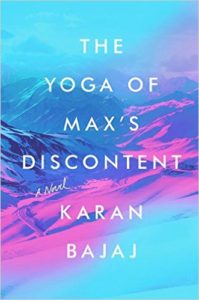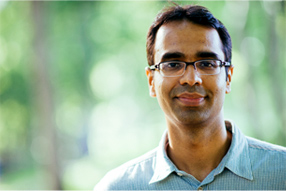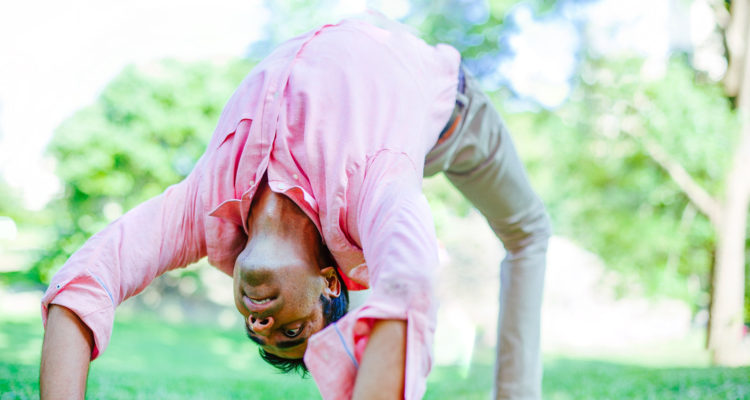The Yoga of Max’s Discontent by Karan Bajaj tells the story of Max Pzoras, a Wall Street analyst who, in the wake of his mother’s death, struggles with a lack of meaning in his life. Max quits his high-paying job and embarks on a spiritual journey in India, hoping to find some kind of enlightenment through yoga. Max’s voyage from hidden night markets to remote ashrams and Himalayan caves is simultaneously philosophical and suspenseful, making The Yoga of Max’s Discontent a rare kind of book: a fast-paced trek of the mind.
We are happy to discuss the book and its origins with Karan Bajaj.
Kelly Sarabyn: Before Max takes off on his spiritual journey, his life, in many ways, embodies the American Dream. He grows up in crime-ridden housing projects, and manages to matriculate at Harvard and then develop a successful career on Wall Street. But after his mother dies, he wonders what the point of it all is. He feels like an imposter. One day, watching his boss, he thinks, “He couldn’t live her life anymore.” Why do you think a life in the American upper class proved so hollow and unfulfilling for Max?
Karan Bajaj: In India where I grew up, you see the reality of human suffering in a very visceral, personal way. For instance, I’d run into a maimed fruit-seller and children begging on the street everyday on my way to school despite living in a very idyllic Himalayan town. That leads to a lot of questions on why suffering occurs and why the world is so fundamentally unjust. I think you get divorced from that reality in the US because poverty is so segregated. For Max, his mother’s death becomes the trigger that forces him to reflect on the disconnect between the extreme poverty and violence he grew up with in the Bronx housing projects and the comfortable upper class he lives in now.
KS: Max decides to seek spiritual answers in India after an Indian man running a food cart in Manhattan tells him of yogis’ amazing abilities. Why do you think Max was so drawn to the way of the yogis?
KB: On the surface, I think Max was just looking to escape from his life and was drawn to the image of men in the solitary, ice-capped Himalayas away from civilization with its wants and pains. The deeper answer, though, pushes the boundaries of our rational Western experience. I think he feels an inexorable pull to the Himalayas because of lives past and his deep-rooted inclination for the extreme physical experiences and mystical contemplation that characterize the life of a yogi.

KS: During Max’s studies in India, he accomplishes physical feats that seemed improbable. He survives on little food and water, and in extremely cold temperatures without much gear. He also appears to affect a person’s well-being who is thousands of miles away. Do you believe yoga and meditation can give humans supernatural powers? As far as I know, it has been demonstrated that meditation can give practitioners increased control over their body, but not to the point of defying basic human needs like hydration and sustenance. How far do you think yogis can go in defying typical human restrictions and needs?
KB: To paraphrase a quote from a character in the book, “I’ve seen things with these very eyes that can make one believe almost anything”! If you study ancient yogic text like the Hatha Yoga Pradipika and The Yoga Sutras of Patanjali, they go into tremendous scientific detail on why a yogi starts developing extraordinary physical and mental powers without intending to as he makes his journey from the finite to the infinite. In the book too, I’ve tried to approach yogic powers and control over the body in a rational, balanced way without making it falsely exotic. Let’s take reading thoughts, for example. Words are just a gross form of thoughts and thoughts a gross form of feelings. As the yogi purifies his life, feelings become as easy for him to read as words so it’s not all as mystical as it sounds!
KS: Max leaves behind his newfound wealth when he travels to India, spending just what he needs to survive, much like the yogi he studies under. This made me wonder about the connection between poverty and enlightenment. On the one hand, chasing money can certainly be a distraction from spirituality. On the other hand, a certain amount of money seems necessary to have the time, health and energy to focus on spiritual matters. Max, for example, wouldn’t have been able to afford the trip to India if he had remained in the housing projects, living paycheck to paycheck. In the bible, it says “it is easier for a camel to go through the eye of a needle than for a rich man to enter the kingdom of God.” Do you think there is a similar sentiment about the rich and reaching enlightenment?
KB: That’s an excellent question, Kelly. In the Yoga Sutras, we have this analogy that the journey of life is like the flight of an eagle. First, you flap your wings high, as high as you can flap them, pushing the boundaries of experience as much as you can, then you bring the wings down, go within, and complete your journey. Rather than wealth, I’d use the analog of experience, which often comes through wealth. There’s a role for chasing experiences, then you start feeling a certain monotony sets in the predictable patterns of the highs and lows of worldly experience, and you experience the innate call to go within. If you’ve never had a chance to stretch the boundaries of experience, you’ll probably never have the desire to go within. So indeed, a certain amount of money and as a result, experiences in the world are necessary I think before you receive the spiritual call.
KS: Not to ask too big of a question, but can you explain the role of attachments and personal love in reaching enlightenment? Max, when he was on his journey to reach enlightenment, felt like he needed to get rid of all his personal attachments. This seemed particularly cruel with respect to his younger sister, as after the death of their mother, Max seemed to be the only family his sister had left. It was unclear to me why this cruelty—Max ignoring his sister’s inquiries about his life—was necessary to reach enlightenment, especially since compassion toward the villagers living near their ashram seemed to be part of the journey toward enlightenment.
KB: The core idea is that your feelings of love and compassion evolve by itself from the narrow to the universal as your sense of individual identity dissolves with yogic practices. I think Max may have made the mistake of trying to force this state rather than let it come over him naturally but of course, readers will be the best judge.
KS: Did you read Eat, Pray, Love? It was an immensely popular book, and one third of it covered the author’s months spent in an ashram in India, searching for spiritual enlightenment. What do you think, more generally, about how Americans approach the study of yoga?
KB: I did read Eat, Pray, Love and enjoyed it a lot as one person’s very personal experience with yoga. Overall, I don’t think there’s a broad characterization I can make. I’ve met incredibly serious American yogis on the path of dissolving their sense of self with yoga. On the other hand, I’ve also experienced a little bit of the charade of Western yoga with people using words like “vibrations,” “chakras” and “energy fields” and wearing loose-fitting clothes and such without full understanding or intent.
KS: In writing this book, you took a year sabbatical from your job in corporate America to study and travel in India. Was the book inspired by experiences you had during that year? Were there similarities between your spiritual journey and Max’s?
KB: Indeed, a lot of it was inspired by that year. I think my own questions about the nature of human suffering became more urgent for me to answer after my mother’s death. So in 2013, my wife and I set forth as monks with a metaphorical begging bowl, going from Europe to India by road with no possessions, then learning yoga and meditation in a remote ashram in the Himalayas.
 Much of the adventure through secret India—hidden yoga ashrams, surreal night markets, remote Himalayan caves—that occurs in the book is a fictionalized account of the places I visited. To give you a sense, I read more than seventy books and hundreds of newspaper articles to research the first thirty pages of the book, which are set in the Bronx housing projects. The remaining 270 pages that are set in India required almost no research at all. I was living Max’s life in that period.
Much of the adventure through secret India—hidden yoga ashrams, surreal night markets, remote Himalayan caves—that occurs in the book is a fictionalized account of the places I visited. To give you a sense, I read more than seventy books and hundreds of newspaper articles to research the first thirty pages of the book, which are set in the Bronx housing projects. The remaining 270 pages that are set in India required almost no research at all. I was living Max’s life in that period.
KS: Do you think changing your cultural surroundings and studying yoga played a role in generating your creative output? Is there a connection between the practice of yoga and creativity?
KB: At the heart of yoga is the idea of chitta vritti nirodah, or stilling the fluctuations of the thought waves of the mind. You get a direct, mystical insight into the nature of reality when your thoughts are completely silent. I’m nowhere close to that state but I think my practice of meditation and yoga allows me just a slight pause between my action-reaction cycle. Instead of reacting to the usual daily stressors—petty politics at work, the difficulty of publishing as a debutant, two kids under two years old, etc., immediately—I have this spontaneous noting that happens within me—“I’m getting stressed”—which immediately diminishes the force of the reaction. This does save a lot of psychic energy which I think channels into creative endeavors.
KS: When your sabbatical was over, did you feel like you were able to incorporate the spiritual and creative insights of your journey back into your day-to-day life? In the book, we saw two serious students of yoga leave the ashram to return to their homes, families and jobs, but we never find out if they were able to incorporate what they learned into their old lives. In some ways, it seems more complicated to do so. What was your experience?
KB: In Sanskrit, we have this beautiful word called “dharma,” which is the innate tendency of every being. The tree bears fruit, the water quenches thirst, in the same way, each person is born with a certain innate thrust. I think I have a natural tendency towards business so I feel in my element in the world of corporate jobs and material concerns—and was quite comfortable on return. Having said that, over the last decade, I’ve followed what I call a 4,1,4 model:
4 Years: Extreme goal-directed living—working at my corporate job, disciplined reading/writing/researching, etc.
1 Year: Complete slack—take a sabbatical where I travel without a goal, write when I want to, meditate, work in an orphanage, basically allowing myself the space to just be and discover facets of myself without the constant hankering to become.
4 Years: Return to corporate/goal-directed life.
…and so on.
I’ve done three cycles of this and traveled, deepened my writing, and learnt yoga and meditation in my sabbaticals. I think this in-and-out model is allowing me to have the right mix of tightness and slackness, discipline and repose, to be both in the thick of the world and remain somewhat unmoved by it.
KS: Professionally, you work in advertising and marketing. What is your take on marketing and the book industry? With the rise of self-publishing and independent publishers, there are more and more books put out every year. Has this made a proposed book’s marketability—both in terms of its “hook,” and the author’s platform—more important in getting published with the larger publishing companies? Did your professional experience as a marketer help you successfully pitch your book?
KB: I think fiction and non-fiction are different. For fiction, the author’s platform, marketing budget, etc., is just a nice-to-have. Agents and editors truly have to fall in love with your idea and story since readers are really engaging in the story rather than the person behind the story. In non-fiction though, the platform is equally if not more important than the idea since a reader is buying a book to gain knowledge from an expert. So my marketing acumen, if any, didn’t help at all with pitching this novel. Now, I’m putting my best marketing knowledge in launching the book—I hope it works but ultimately, writing has to be its own reward.
Karan Bajaj is a #1 bestselling Indian novelist with more than 200,000 copies of his novels in print, both optioned into major films. Karan’s first worldwide novel, The Yoga of Max’s Discontent, is being published by Random House this week. The book, called “the greatest adventure of our Generation” by The Daily Telegraph, was inspired by Karan’s one-year sabbatical traveling from Europe to India by road and learning yoga and meditation in the Himalayas.
To celebrate the launch of his book, Karan is offering a free meditation course, a Quit Sugar in 7 Days nutrition guide, a yoga flow video course and other transformational gifts worth $299 when you order the book in the launch week (150 Spots Only)! Details at www.karanbajaj.com/yogamax



[…] The Yoga of Max’s Discontent: A Novel, by Karan Bajaj. The rare book that manages to be both philosophical and a page turner. Follow Max as he leaves the New York City rat race behind to test his body and spirit on an adventure through India. Hidden night markets, Himalayan caves and remote ashrams bring this book alive. Read my interview with Karan here. […]